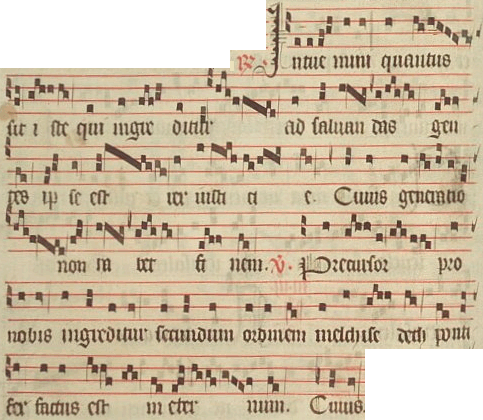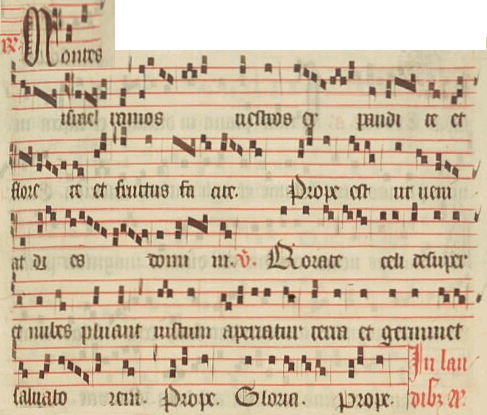Even Years: St. Anselm, Proslogion, ch. 1
Eia nunc, homuncio, fuge paululum occupationes tuas, absconde te modicum a tumultuosis cogitationibus tuis. Abice nunc onorosas curas, et postpone laboriosas distensiones tuas. Vaca aliquantulum Deo, et requiesce aliquantulum in eo.
Intra in cubiculum mentis tuae; exclude omnia praeter Deum et quae te iuvent ad quaerendum eum, et, clauso ostio, quaere eum. Dic nunc, totum cor meum, dic nunc Deo: Quaero vultum tuum; vultum tuum, Domine, requiro.
Eia nunc ergo, tu, Domine Deus meus, doce cor meum ubi et quomodo te quaerat, ubi et quomodo te inveniat.
Domine, si non es hic, ubi te quaeram absentem? Si autem ubique es, cur non video te praesentem? Sed certe habitas lucem inaccessibilem. Et ubi est lux inaccessibilis, aut quomodo accedam ad lucem inaccessibilem? Aut quis me ducet, et inducet in illam, ut videam te in illa? Deinde, quibus signis, qua facie te quaeram? Numquam te vidi, Domine Deus meus; non novi faciem tuam.
Quid faciet, altissime Domine, quid faciet iste tuus longinquus exul? Quid faciet servus tuus anxius amore tui, et longe proiectus a facie tua? Anhelat videre te, et nimis abest illi facies tua. Accedere ad te desiderat, et inaccessibilis est habitatio tua. Invenire te cupit, et nescit locum tuum. Quaerere te affectat, et ignorat vultum tuum.
Domine, Deus meus es, et Dominus meus es, et numquam te vidi. Tu me fecisti et refecisti, et omnia mea bona tu mihi contulisti, et nondum novi te. Denique ad te videndum factus sum; et nondum feci propter quod factus sum.
Et o tu, Domine, usquequo? Usquequo, Domine, oblivisceris nos, usquequo avertes faciem tuam a nobis? Quando respicies et exaudies nos? Quando illuminabis oculos nostros, et ostendes nobis faciem tuam? Quando restitues te nobis?
Respice, Domine, exaudi, illumina nos, ostende nobis teipsum. Restitue te nobis, ut bene sit nobis; sine quo tam male est nobis. Miserare labores et conatus nostros ad te, qui nihil valemus sine te.
Doce me quaerere te, et ostende te quaerenti; quia nec quaerere te possum, nisi tu doceas, nec invenire, nisi te ostendas. Quaeram te desiderando, desiderem quaerendo, inveniam amando, amem inveniendo.
Odd Years: Cyril of Alexandria, On Isaiah (Lib 3, t. 5: PG 70, 849-853)
| Ἦν γὰρ καὶ ἔστιν ἀεὶ βασιλεὺς, καὶ τῶν ὅλων Κύριος ὁ ἐκ Παρθένου Λόγος. Ἐπειδὴ δὲ γέγονεν ἄνθρωπος, ἴδιον ποιεῖται τὸ τῆς ἀνθρωπότητος μέτρον. Οὕτω γὰρ ἦν ἀληθῶς, καὶ ἀνενδοιάστως πιστεύεσθαι πρὸς ἡμῶν, ὅτι γέγονε καθ' ἡμᾶς. Οὐκοῦν κἂν εἰ λέγοιτο λαβεῖν τὸ κατὰ πάντων κράτος, τῆς μετὰ σαρκὸς οἰκονομίας ἔσται τὸ λαβεῖν, οὐ τῆς ὑπεροχῆς αὐτοῦ, καθ' ἣν νοεῖται τῶν ὅλων Δεσπότης. Ἰακὼβ δὲ αὐτὸν ἀποκαλεῖ καὶ Ἰσραὴλ,ὡς ἐξ αἵματος γεγονότα τὸ κατὰ σάρκα τὸν ἐξ Ἰακὼβ, ὃς μετωνομάσθη καὶ Ἰσραήλ. Φησὶ δὲ, ὅτι Ἀντιλήψομαι, καὶ ἀπόλεκτον ὀνομάζει. Συνειργάζετο γὰρ ὁ Πατὴρ τῷ Υἱῷ, καὶ ὡς δυνάμεως τῆς ἰδίας ἀπετέλει τὰς μεγαλουργίας. Ἔστι δὲ καὶ ἀπόλεκτος ἀληθῶς, ὅτι καὶ ὡραῖος κάλλει παρὰ τοὺς υἱοὺς τῶν ἀνθρώπων, καὶ παραδεκτὸς ὡς ἠγαπημένος· ηὐδόκησε γὰρ ὁ Θεὸς καὶ Πατὴρ ἐν αὐτῷ. Ἔφη γοῦν· Οὗτός ἐστιν ὁ Υἱός μου ὁ ἀγαπητὸς, ἐν ᾧ ηὐδόκησα.
| The Word of God, born of the Virgin, was and is eternally King and Lord of all, but when he became man he made the limitations of humanity his own. For man he truly was; we must unhesitatingly believe that he became like us. Consequently, when it is said that all power has been given to him, this means that it has been given to him in the human nature he assumed, not in his divine pre-eminence in virtue of which he is the acknowledged Lord of all.
Christ is named 'Jacob' and 'Israel' because by physical descent he was the blood relative of Jacob, who received the new name Israel. I will help him, God says, and calls him his chosen one. For the Father cooperated with the Son, performing the mighty works he did as works of his own power; and Christ is in truth the chosen one, since he is the fairest of the sons of men and accepted as God's beloved. The Father rejoiced in him and declared: This is my beloved Son in whom I am well pleased.
| | Ὅτι δὲ κέχρισται κατὰ τὸ ἀνθρώπινον, καὶ μετεσχηκέναι λέγεται τοῦ ἁγίου Πνεύματος, καίτοι τὸ Πνεῦμα διδοὺς αὐτὸς, καὶ ἁγιάζων τὴν κτίσιν, σαφηνιεῖ λέγων· Ἔδωκα τὸ Πνεῦμά μου ἐπ' αὐτόν. Βαπτισθέντι γὰρ αὐτῷ τὸ Πνεῦμα, φησὶν, ἐπεφοίτηκεν ἐξ οὐρανῶν ἐν εἴδει περιστερᾶς καὶ ἔμεινεν ἐπ' αὐτόν. Εἰ δὲ ἐν καιρῷ τοῦ βαπτισθῆναι δέχεται τὸ Πνεῦμα τῷ τῆς ἀνθρωπότητος μέτρῳ, εἴη ἂν μετὰ τῶν ἄλλων, καὶ τοῦτο. Οὐ γάρ τοι καθ' ὃ Θεός ἐστιν, ἡγιάζετο τὸ Πνεῦμα λαβών· αὐτὸς γὰρ, ὡς ἔφην, ὁ ἁγιάζων ἐστίν· ἀλλὰ καθὸ πέφηνεν ἄνθρωπος οἰκονομικῶς.
| In his human nature Christ was anointed and can be said to share in the Holy Spirit, even though he is the giver of the Spirit and the sanctifier of all creation. This is shown clearly by the words, I have put my Spirit upon him. The Gospel says that when Jesus was baptized the Spirit, in the form of a dove, came to him from heaven and remained on him. [If, at the time of his baptism, he received the Spirit in the measure of his humanity, he would be like everyone else in this. For, according as he is God, his is not sanctified by receiving the Spirit. For he is, as I said, the sanctifier. But this reception was according as he appeared in human form in God's plan.]
| | Κέχρισται τοίνυν, ὥστε κρίσιν τοῖς ἔθνεσιν ἐξοῖσαι. Κρίσιν δὲ τὴν δικαιοκρισίαν ἐν τούτοις φησί. Δεδικαίωκε γὰρ αὐτὰ κατακρίνας τὸν πλεονεκτήσαντα Σατανᾶν. Καὶ τοῦτο ἡμᾶς αὐτὸς ἐδίδαξεν, εἰπών· Νῦν κρίσις ἐστὶ τοῦ κόσμου τούτου. Νῦν ὁ ἄρχων τοῦ κόσμου τούτου ἐκβληθήσεται ἔξω. Κἀγὼ ἐὰν ὑψωθῶ ἐκ γῆς, πάντα ἑλκύσω πρὸς ἐμαυτόν.
| This anointing was to enable him to bring justice to the nations, which he did by condemning Satan, their tyrant. Christ taught us this himself when he said: Now is the time for this world to be judged, now shall the ruler of this world be cast out. And I, when I am lifted up form the earth, will draw all things to myself.
| | Κατεψηφίσατο μὲν γὰρ τὸν ὄλεθρον τοῦ πλεονεκτήσαντος, ὡς ἔφην, τὴν ὑπ' οὐρανὸν, ὁσίῳ δὲ κρίματι σέσωκε τοὺς ἠπατημένους. Ἀλλ' οὐ κεκράξεται, φησὶν, οὐδὲ ἀνήσει, οὐδὲ ἀκουσθήσεται ἔξω ἡ φωνὴ αὐτοῦ. Ἐπεδήμησε γὰρ ὁ τῶν ὅλων Σωτὴρ καὶ Κύριος ἐν ὑφέσει πολλῇ καὶ ἀφιλοκομπίᾳ, καὶ οἷον ἀψοφητὶ, καὶ ἀδικῶν οὐδένα· ἀλλ' ἐν σιγῇ τε, καὶ ἠρεμίᾳ, ὥστε καὶ συντεθλασμένον μὴ συντρῖψαι κάλαμον, μήτε μὴν λῖνον τυφόμενον σβέσειν, τοῦτ' ἔστι, μήτε τοῖς ἄγαν εὐτελεστάτοις καὶ εὐτολμότατα λίαν ὑπομένειν εἰωθόσι τὸ βλάβος ἐπαφεῖναι πόδα.
| He passed sentence of destruction on Satan who had held this world in thraldom, and by that righteous sentence saved those who had been deceived.
But he will not shout, says Scripture, or raise his voice, or let it be heard in the street. The Saviour and Lord of all came to dwell among us in profound lowliness and humility, one might say without making a sound, and he did no harm to anyone. He came in silence and peace, so as not to crush the bruised reed or extinguish the smouldering wick.
| | Τί οὖν ἐργάσεται, καὶ τί κατορθώσει τοῖς ἔθνεσιν; Εἰς ἀλήθειαν ἐξοίσει κρίσιν. Ἐν τούτοις ἔοικε τὸν νόμον ἀποκαλεῖν. Γέγραπται γὰρ περὶ τοῦ Ἰσραὴλ, καὶ τοῦ πάντων κρατοῦντος Θεοῦ, ὅτι ἐκεῖ ἔδωκεν αὐτῷ δικαιώματα καὶ κρίσιν· καὶ πάλιν, Κρίσιν καὶ δικαιοσύνην ἐν Ἰακὼβ σὺ ἐποίησας. Τὴν κρίσιν τοίνυν ἤτοι τὸν νόμον τὸν ἐν σκιαῖς ὄντα καὶ τύποις, εἰς ἀλήθειαν ἐξοίσει τῶν εὐαγγελικῶν θεσπισμάτων, δι' ὧν τῆς ἀρεσκούσης αὐτῷ πολιτείας ἀνέδειξε τὴν ὁδὸν, καὶ τὴν ἐν γράμματι κατὰ νόμον λατρείαν μετέστησεν εἰς ἀλήθειαν...
| What will his work be, what will he do for the nations? He will bring judgement to the truth. By judgement the prophet seems to mean the law, for it is written about Israel and about God, the ruler of all: You have established judgment and justice in Jacob. So now he will bring judgement, or the law which was concerned with shadows and types, to the truth of the Gospel. Through the Gospel he has shown the way of life that is pleasing to him and has changed worship according to the letter of the law into worship in truth.
| | Κεκήρυκται γὰρ τὸ Εὐαγγέλιον ἐν πάσῃ τῇ γῇ, καὶ οἷον πέπηγε τὰ αὐτοῦ θεσπίσματα. Γέγραπται γὰρ, ὅτι Δικαιοσύνη εἰς τὸν αἰῶνα, καὶ ὁ νόμος σου ἀλήθεια. Ἤλπισέ γε μὴν τὰ ἔθνη, φησὶν, ἐπὶ τῷ ὀνόματι αὐτοῦ. Ἐπεγνωκότα γὰρ ὅτι Θεὸς κατὰ ἀλήθειαν ἐστὶ, καὶ εἰ πέφηνε σαρκὶ, αὐτὸν ἐλπίδα ποιήσονται, καὶ καθά φησιν ὁ Ψάλλων· Ἐν τῷ ὀνόμασι αὐτοῦ ἀγαλλιάσονται ὅλην τὴν ἡμέραν. Κεκλήμεθα γὰρ Χριστιανοὶ, καὶ ἐπ' αὐτῷ πᾶσαν ἔχομεν ἐλπίδα.
| [The Gospel was preached all over the world, in fulfilment of inspired utterances. For it is written: "His justice remains forever, and your law is truth." And it says: The gentiles trusted in his name. For, since they knew that he is truly God, who appeared in flesh, they will put their hope in him, as the Psalmist says: In his name they rejoice the whole day. We are called Christians, and we put all our trust in him.]
|
| |

